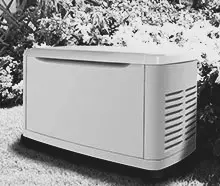What are the different types of generators?
Portable Generator
These small, compact generators are easy to carry and typically run on gasoline, propane, or solar energy. They’re great for camping trips or emergency use and are typically the most affordable option. However, they sacrifice power production for mobility and affordability and require manual start-up.
Standby Generator
These larger generators are essentially permanent fixtures outside the home. They run on natural gas or propane and automatically kick in during power outages. They are ideal for backup power at home, especially for people who don't want any start-up work, but are the most expensive option.
Solar Generator
These use solar panels to convert sunlight into electricity. They’re renewable and emission-free but may have limited capacity.
Can I install the generator myself?
Portable Generator
Connecting a portable generator directly to your home power supply can be hazardous. It may increase voltage or cause a surge to the outside power lines, potentially injuring or electrocuting utility linemen. It also bypasses built-in household circuit protection devices. To avoid this risk, use heavy-duty extension cords to connect appliances to the generator. For safer installation, consult a qualified electrician or ask your utility company to install an appropriate power transfer switch.
Standby Generator
Most homeowners are not qualified to complete a standby generator system installation on their own. The job requires above-average knowledge of residential electrical systems that goes beyond the average handyman project. There are also plumbing skills to consider, and pipe runs for a natural gas or propane connection to the new generator.
Building permits and inspections are required and failure to include this aspect of the install may void your homeowner's insurance.
Remember: The building inspector can fail the project based on who did the work. If they didn't approve the contractor, including you, they may fail the project and require you to have the work redone by a qualified person.
Where can I install the generator?
Some units meet fire codes that allow installation as close as eighteen inches from a home, but that does not mean they will meet local codes. Our team will ensure we place your generator properly.
Generators can only be placed outdoors, as they produce carbon monoxide, a colorless, odorless gas that can reach deadly concentrations in just minutes.
Do you have neighbors? Your installation will affect them with noise and exhaust. Minimizing these factors is important. At twenty feet, a quality air-cooled unit makes about as much noise as a central air conditioner. Avoid putting the generator any closer.
We'll locate the generator as close to the gas supply as possible to minimize plumbing costs but keep other considerations in mind such as exhaust and noise when choosing a site.
Working with BellMax Electric means you can let us handle all of these details.
What do I need to get started?
If you want a standby generator installed, you will need approvals from both your homeowners' association and the local building department. Don't purchase materials or start any work until you secure the essential building permit.
Consider the essential appliances you wish to power during a power outage. You can opt for a basic setup to sustain necessities like refrigeration, heating, and lighting, or indulge in a comprehensive solution that ensures all regular comforts are maintained seamlessly. This decision will determine the appropriate standby power capacity required for your needs.
Consult a comprehensive guide to select a generator that aligns with your requirements. Bear in mind that household power demands are prone to increase over time, so it is prudent to anticipate future needs and select a generator size that can accommodate potential growth.
It is advisable to have a direct conversation with the building inspector to gain insights that could prevent obstacles in the future and familiarize yourself with the mandatory building inspections.
Each aspect of the project will require at least one inspection, encompassing assessments of the foundation, electrical components, and plumbing systems. In some regions, preliminary and final inspections may also be mandated to ensure compliance with regulation.
If you want a turnkey solution - turn to BellMax Electric.
